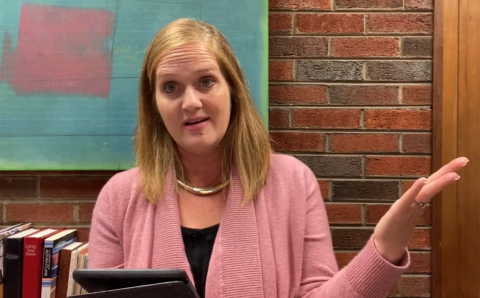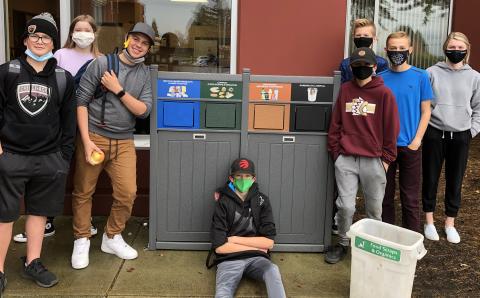Reports to the Christian Reformed Church’s Council of Delegates in February brought to light long-standing harassment that staff of the denomination’s Office of Social Justice and the CRC’s Race Relations office experience as they carry out their work.
As the Council of Delegates heard at its recent meeting, staff regularly encounter “incidents of bullying and name-calling (and so much more)” (Minutes of the Council of Delegates of the CRCNA, Feb. 17-19, 2021, parentheses original to the minutes).
“While this issue may be newly exposed to those in the CRCNA, it is unfortunately not new,” wrote CRC executive director Colin Watson Sr. and Paul DeVries, chair of the Council of Delegates, in a March 23 follow-up addressing questions about the incidents.
Some of the received communications and threats were delivered anonymously. Other examples came from within the church. “As the COD looked at examples of the things that staff have endured, it was painfully clear that CRC members, including officebearers, were involved in multiple instances,” DeVries and Watson wrote in the March 23 communication.
So why is this happening?
Mike Hogeterp, who works within the denomination’s justice ministries as the director of the Christian Reformed Centre for Public Dialogue in Canada, shared his perspective with The Banner. “There are long-standing theological debates on the nature and limits of social justice and anti-racism work in the church,” said Hogeterp. “These debates have often shaped and nuanced CRC justice work on both sides of the border in healthy ways. But the toxic polarization that has grown recently in the wider culture has found its way into the church and has led to incivility and a failure to respect one another in the way I think Romans 12 calls us to. This hurts our public witness to Christ's call to justice and the reconciliation of all things.”
Debates at Synod
Such debates about justice bubbled up at Synod 2017 and Synod 2018. (Synod is the annual general assembly of the CRC.)
Synod 2018 tried to address the divide. It didn’t want to back down from “engaging in the social/political/economic layers of public life,” but it urged churches to “continue to pray for our nations for justice and mercy to prevail.” Further, it pointed out that “in the significant majority of cases, it has been synod itself that has provided the initial instruction behind CRCNA social justice activity” (and later included an addendum of examples in its Acts of Synod). It also asked the Council of Delegates to create a committee of guidance and support for the Office of Social Justice (Acts of Synod 2018, pp. 524-528).
Synod 2019, after receiving differing requests about the 2012 decision to encourage member churches to take an active role in the climate change issue, decided more clarity is needed. “Differing political understandings of justice continue to come before synod, along with questions about what matters are ecclesiastical and therefore appropriate to be enacted at the levels of synod, classes, and local councils,” Acts of Synod 2019 says (p. 821). So synod asked the Council of Delegates to provide historical research on the rationale for past synodical decisions related to political matters, hoping to “fully answer: ‘What is an ecclesiastical matter, and what is the rationale for determining it?’”
The Council did some of that research, but it wants synod to appoint its own study committee to discern and develop a definition of “ecclesiastical.” Because synod hasn’t met since 2019, that recommendation, found in Agenda for Synod 2020 (p. 41), hasn’t had a hearing. (The synods of 2020 and 2021 have been canceled due to the COVID-19 pandemic.)
Committee for Guidance and Support
Meanwhile, the committee requested by Synod 2018 to provide guidance and support for OSJ has been established. The Council of Delegates decided on the committee’s mandate and composition in October 2018. By September 2019 the committee had had its first meeting. So far, it has leaned into the support part of its mandate—a stance that’s “very appropriate considering the level of bullying that has gone on,” said Mark Stephenson, interim director of OSJ and Race Relations.
Minutes of a November 2020 meeting of the Committee for Guidance and Support of the OSJ note that a consultant was engaged “to facilitate a series of in-depth conversations among staff to help them move beyond the pain and anger they are experiencing in their work. So far, the conversations have been very helpful.”
In addition to publishing a statement concerning harassment of staff March 23, Stephenson said, the committee also established a new email address, OSJ_Committee@crcna.org, so people can “connect directly with committee members.”
Statements of support for staff should not be seen as shutting down others’ views on justice issues.
“We're not for a moment trying to suppress disagreement,” Stephenson said. “The concern is when people, instead of articulating ‘these are my concerns about this position of the Office of Social Justice,’ they launch into ‘you’re out of your minds’ or labeling.
“That's not only unhelpful, it’s un-Christian, and what my hope is through all this exposure is together we can start to learn about how to apply Philippians 2—how to have the mind of Christ among you in our speech, in our conversations, in our disagreements; that we are humble, gentle, respectful. That would be my hope of what would come out of this,” Stephenson said.
Responses and Next Steps
Philippians 2—a charge to imitate Christ’s humility—is mentioned in the preamble to a Code of Conduct proposed by the Council of Delegates to be adopted by synod for all ministry leaders in the CRC.
It’s one of the steps called for by Synod 2019 to address and prevent abuse of power. The Council adopted the code for its own use in spring 2020. At its recent February meeting, members were reminded of it, and it was noted that the chair and vice chair of the Council would speak with one individual who had violated the Code of Conduct and would “report back to the Executive Committee if additional input is needed” (Minutes of the COD Executive Committee, Feb. 17).
Asked about this after the Q&A document was posted on March 23, DeVries said the matter “is still in process, and the Executive Committee is actively following up as it said it would. It would be inappropriate for me to comment further.”
Council members were also encouraged to speak up about unkind speech. “Members are strongly encouraged to confront anyone speaking in a derogatory manner—it is not Christian. We are called to be ‘light’” (Minutes of the Council of Delegates of the CRCNA, Feb. 17-19, 2021).
The Office of Social Justice and Hunger Action was established in 2000, after a world hunger and social justice coordinator had been appointed in 1994, a response to world hunger reports adopted by Synods 1979 and 1993.
About the Author
Alissa Vernon is the news editor for The Banner.








